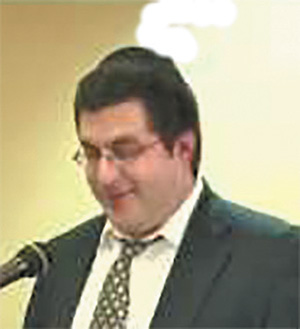
My kids’ yeshiva always has parent-teacher conferences a Sunday or two before Pesach, for some reason. It’s very annoying, because I’m pretty busy that day. And I was just at the teacher’s house on Purim. We couldn’t talk then? I think, with some of my kids, I’d rather get the teacher when he’s drunk.
I think they schedule conferences then because they figure that we’re all cleaning our houses, which means that we’re home. It’s very hard to clean your house when you’re not home. So they pull us out of our homes for conferences. As soon as the kids come home—early, even for a Sunday—we have to run out, leaving them smack in the middle of a messy house, to go talk about them. You’d think that whichever one thinks he’s going to get a bad report would at least clean while we’re gone.
Sure, we can leave one parent home, but in general, my wife and I both go, because we’ve been breathing cleaning fumes all day, plus whatever the vacuum cleaner is blowing at our faces, but hopefully together we make one coherent adult.
And maybe we save time if we both go. Anything that one person can do, two people can do twice as fast, right? We can both fire questions at the poor teacher and get out in half the time.
See? I’m not coherent.
You’d think we wouldn’t need conferences at all nowadays, what with there being 5,000 other ways to communicate, but we need to go to find out how the kid is doing. Because for some reason, the report card doesn’t tell us anything—it has weird letters and numbers plus a “Teacher’s Comment” that sounds positive no matter how the kid is doing. (“Your son is always full of energy, especially in class, and excels in commanding the attention of the entire room. When I’m trying to.”)
And report cards are only getting worse.
I’m a teacher too, in a high school, but I don’t give letter grades; I just write down the kid’s average. Letter grades mean basically nothing. If you get, say, a B+, you still have to consult a chart to see what the corresponding number is. And I have to refer to the chart to come up with the letter in the first place. Why exactly are we not writing numbers?
But then I look at my kids’ report cards, and they don’t even have a normal letter system.
When I was growing up, we had A, B, C, D and F. There was no E, because we always got the feeling that there was one kid in the class explaining to his immigrant parents that E actually meant excellent.
But at least with that system, I kind of understand where the grade is. My kids don’t come home with that. One of my kids got an E on his report card, and I was like, “E is worse than D! I didn’t just get off the boat!” And then I found out that E actually is excellent these days, unless my kid faked the key at the bottom. There’s no ABCDF anymore. They have E, followed by G, then S, then N and then U. That’s not even alphabetical order. And I could have sworn that last year, N was better than S. I read the report card, and I had to refer to the chart 17 times, until I realized that the letters actually stood for stuff.
Yes, apparently, they stand for Excellent, Good, Satisfactory, Needs improvement and Unavailable.
That’s unacceptable. What was wrong with the ABC system? I guess it was making kids feel bad. Even the weakest students know those letters, because they’re the first ones they learn. It’s called, “The ABCs.” But nowadays, the kids peek at their report cards and have no idea what they’re looking at. This way, kids don’t have to feel bad about their grades, and they don’t have to decide to work harder. Though if we want the kids to feel good, we shouldn’t make them go to school in the first place. Even good kids will tell you that.
And should we bring this system over to Limudei Kodesh, and get rid of alef beis gimmel daled fey? Sure! We’d have Metzuyan (מ), Tov (ט), Masbia ratzon (מ), Ta’un shipur (ט) and Efess (א)!
“Hey! You got an Alef!”
I teach high school, so I don’t really have time to make anyone feel good. I see them for 40 minutes a day, tops, and I have to transition them, mentally, from a system of “Even if you don’t do well, the teacher will come up with an synonym for good so you don’t feel bad,” to “The world isn’t going to bend over backwards for your low grade. The world wants you to get out of the way so they can see the board.”
I do have a five-point system for behavior, though, with 1 being Excellent and 5 being Unacceptable. And according to the key, 2, 3 and 4 are basically euphemisms for Good. Even 4 is “fair.” His behavior is second to worst in the class, and only because he waits until after I finish telling everyone to stop talking before he starts talking again. How is that “fair”?
I do use “4,” though, because that way, if a “student” (in quotes) comes back after the off Shabbos saying, “You gave me a 4? Why did you give me a 4?” I could say, “First of all, you’re arguing with me about this during class. Second, 4 is fair.”
“How is 4 fair?”
“Yiddish. Also, look at the key. 4 = Fair.”
By Mordechai Schmutter









